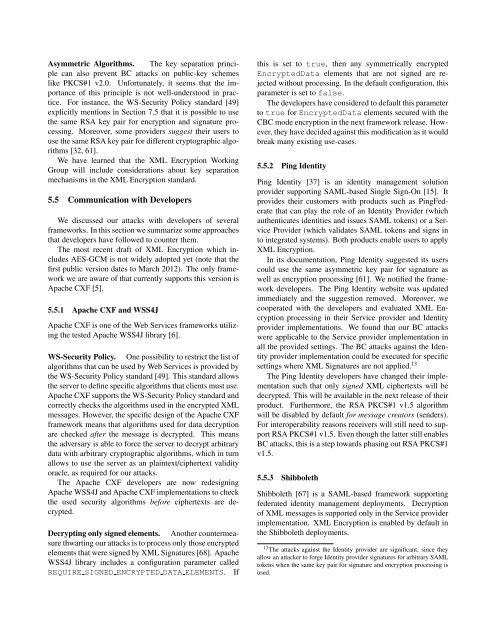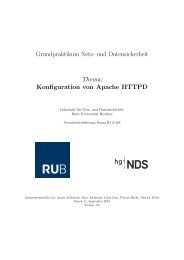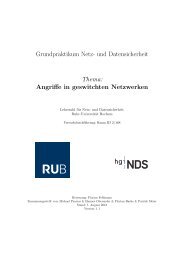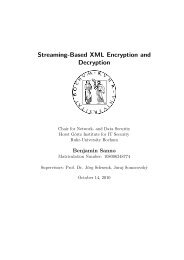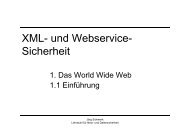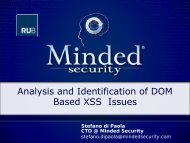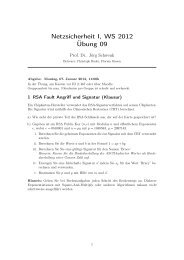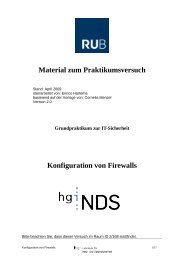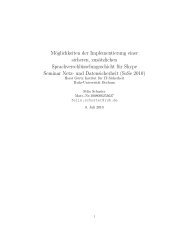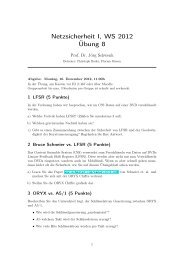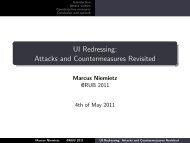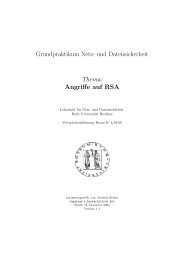One Bad Apple: Backwards Compatibility Attacks on State-of-the-Art ...
One Bad Apple: Backwards Compatibility Attacks on State-of-the-Art ...
One Bad Apple: Backwards Compatibility Attacks on State-of-the-Art ...
Create successful ePaper yourself
Turn your PDF publications into a flip-book with our unique Google optimized e-Paper software.
Asymmetric Algorithms. The key separati<strong>on</strong> principle<br />
can also prevent BC attacks <strong>on</strong> public-key schemes<br />
like PKCS#1 v2.0. Unfortunately, it seems that <strong>the</strong> importance<br />
<strong>of</strong> this principle is not well-understood in practice.<br />
For instance, <strong>the</strong> WS-Security Policy standard [49]<br />
explicitly menti<strong>on</strong>s in Secti<strong>on</strong> 7.5 that it is possible to use<br />
<strong>the</strong> same RSA key pair for encrypti<strong>on</strong> and signature processing.<br />
Moreover, some providers suggest <strong>the</strong>ir users to<br />
use <strong>the</strong> same RSA key pair for different cryptographic algorithms<br />
[32, 61].<br />
We have learned that <strong>the</strong> XML Encrypti<strong>on</strong> Working<br />
Group will include c<strong>on</strong>siderati<strong>on</strong>s about key separati<strong>on</strong><br />
mechanisms in <strong>the</strong> XML Encrypti<strong>on</strong> standard.<br />
5.5 Communicati<strong>on</strong> with Developers<br />
We discussed our attacks with developers <strong>of</strong> several<br />
frameworks. In this secti<strong>on</strong> we summarize some approaches<br />
that developers have followed to counter <strong>the</strong>m.<br />
The most recent draft <strong>of</strong> XML Encrypti<strong>on</strong> which includes<br />
AES-GCM is not widely adopted yet (note that <strong>the</strong><br />
first public versi<strong>on</strong> dates to March 2012). The <strong>on</strong>ly framework<br />
we are aware <strong>of</strong> that currently supports this versi<strong>on</strong> is<br />
Apache CXF [5].<br />
5.5.1 Apache CXF and WSS4J<br />
Apache CXF is <strong>on</strong>e <strong>of</strong> <strong>the</strong> Web Services frameworks utilizing<br />
<strong>the</strong> tested Apache WSS4J library [6].<br />
WS-Security Policy. <str<strong>on</strong>g>One</str<strong>on</strong>g> possibility to restrict <strong>the</strong> list <strong>of</strong><br />
algorithms that can be used by Web Services is provided by<br />
<strong>the</strong> WS-Security Policy standard [49]. This standard allows<br />
<strong>the</strong> server to define specific algorithms that clients must use.<br />
Apache CXF supports <strong>the</strong> WS-Security Policy standard and<br />
correctly checks <strong>the</strong> algorithms used in <strong>the</strong> encrypted XML<br />
messages. However, <strong>the</strong> specific design <strong>of</strong> <strong>the</strong> Apache CXF<br />
framework means that algorithms used for data decrypti<strong>on</strong><br />
are checked after <strong>the</strong> message is decrypted. This means<br />
<strong>the</strong> adversary is able to force <strong>the</strong> server to decrypt arbitrary<br />
data with arbitrary cryptographic algorithms, which in turn<br />
allows to use <strong>the</strong> server as an plaintext/ciphertext validity<br />
oracle, as required for our attacks.<br />
The Apache CXF developers are now redesigning<br />
Apache WSS4J and Apache CXF implementati<strong>on</strong>s to check<br />
<strong>the</strong> used security algorithms before ciphertexts are decrypted.<br />
Decrypting <strong>on</strong>ly signed elements. Ano<strong>the</strong>r countermeasure<br />
thwarting our attacks is to process <strong>on</strong>ly those encrypted<br />
elements that were signed by XML Signatures [68]. Apache<br />
WSS4J library includes a c<strong>on</strong>figurati<strong>on</strong> parameter called<br />
REQUIRE SIGNED ENCRYPTED DATA ELEMENTS. If<br />
this is set to true, <strong>the</strong>n any symmetrically encrypted<br />
EncryptedData elements that are not signed are rejected<br />
without processing. In <strong>the</strong> default c<strong>on</strong>figurati<strong>on</strong>, this<br />
parameter is set to false.<br />
The developers have c<strong>on</strong>sidered to default this parameter<br />
to true for EncryptedData elements secured with <strong>the</strong><br />
CBC mode encrypti<strong>on</strong> in <strong>the</strong> next framework release. However,<br />
<strong>the</strong>y have decided against this modificati<strong>on</strong> as it would<br />
break many existing use-cases.<br />
5.5.2 Ping Identity<br />
Ping Identity [37] is an identity management soluti<strong>on</strong><br />
provider supporting SAML-based Single Sign-On [15]. It<br />
provides <strong>the</strong>ir customers with products such as PingFederate<br />
that can play <strong>the</strong> role <strong>of</strong> an Identity Provider (which<br />
au<strong>the</strong>nticates identities and issues SAML tokens) or a Service<br />
Provider (which validates SAML tokens and signs in<br />
to integrated systems). Both products enable users to apply<br />
XML Encrypti<strong>on</strong>.<br />
In its documentati<strong>on</strong>, Ping Identity suggested its users<br />
could use <strong>the</strong> same asymmetric key pair for signature as<br />
well as encrypti<strong>on</strong> processing [61]. We notified <strong>the</strong> framework<br />
developers. The Ping Identity website was updated<br />
immediately and <strong>the</strong> suggesti<strong>on</strong> removed. Moreover, we<br />
cooperated with <strong>the</strong> developers and evaluated XML Encrypti<strong>on</strong><br />
processing in <strong>the</strong>ir Service provider and Identity<br />
provider implementati<strong>on</strong>s. We found that our BC attacks<br />
were applicable to <strong>the</strong> Service provider implementati<strong>on</strong> in<br />
all <strong>the</strong> provided settings. The BC attacks against <strong>the</strong> Identity<br />
provider implementati<strong>on</strong> could be executed for specific<br />
settings where XML Signatures are not applied. 13<br />
The Ping Identity developers have changed <strong>the</strong>ir implementati<strong>on</strong><br />
such that <strong>on</strong>ly signed XML ciphertexts will be<br />
decrypted. This will be available in <strong>the</strong> next release <strong>of</strong> <strong>the</strong>ir<br />
product. Fur<strong>the</strong>rmore, <strong>the</strong> RSA PKCS#1 v1.5 algorithm<br />
will be disabled by default for message creators (senders).<br />
For interoperability reas<strong>on</strong>s receivers will still need to support<br />
RSA PKCS#1 v1.5. Even though <strong>the</strong> latter still enables<br />
BC attacks, this is a step towards phasing out RSA PKCS#1<br />
v1.5.<br />
5.5.3 Shibboleth<br />
Shibboleth [67] is a SAML-based framework supporting<br />
federated identity management deployments. Decrypti<strong>on</strong><br />
<strong>of</strong> XML messages is supported <strong>on</strong>ly in <strong>the</strong> Service provider<br />
implementati<strong>on</strong>. XML Encrypti<strong>on</strong> is enabled by default in<br />
<strong>the</strong> Shibboleth deployments.<br />
13 The attacks against <strong>the</strong> Identity provider are significant, since <strong>the</strong>y<br />
allow an attacker to forge Identity provider signatures for arbitrary SAML<br />
tokens when <strong>the</strong> same key pair for signature and encrypti<strong>on</strong> processing is<br />
used.


